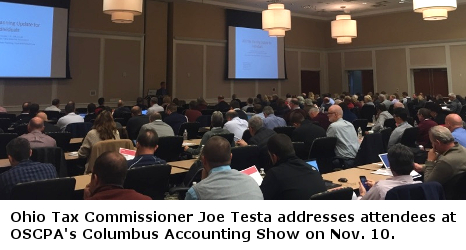Congress is enacting the most sweeping tax legislation in thirty years, one that will make fundamental changes in the way you, your family and your business calculate your federal income tax bill, and the amount of federal tax you will pay. Since most of the changes will go into effect next year, there is still a narrow window of time before year-end to soften or avoid the impact of crackdowns and to best position yourself for the tax breaks that may be heading your way.
Here is a quick rundown of last-minute moves you should think about making.
Posts By: Zinner & Co. Tax Department
Tax Cuts and Jobs Act of 2017: What it means to you and your business
Zinner & Co. Tax Department tax services , Brett W. Neate , Taxes - Corporate & Business , Taxes - Planning, Rules and Returns , Taxes - IndividualSplit Ends: Why we're reading about 'gray divorce'
Zinner & Co. Tax Department divorce , Retirement Planning & IRAsThe Journal of Accountancy recently published an interesting article addressing the issue of 'gray divorce.' Gray divorce refers to couples divorcing later in life and while a 30-something divorcing couple may be squabbling over custody, visitation, and credit card bills, those couples divorcing over age 50 are facing battles over retirement funds, the long-term residence, and a diverse portfolio of assets.
Oftentimes, divorcing couples believe that because the court suggests a particular division of assets, that it is what they must do. Couples may not realize that the court will decide in the absence of either party striking an agreement. When the court makes a decision for the couple, this may not be in the best interest for either.
Learn more about retirement and estate planning in Gary's blogs
Meeting with your CPA, whether as a couple or individually, will allow you to take a closer look at the reality of the tax and financial implications depending on how the assets are ultimately divided. Also, your CPA will run scenarios, especially if one spouse was the higher earner or if one spouse did not work, which will greatly affect the financial future of both.
The Ohio Department of Taxation is offering amnesty from Jan. 1 to Feb. 15, 2018 to individual and business taxpayers.
ODT has launched a statewide campaign to raise awareness of the amnesty. Ohio Tax Commissioner Joe Testa kicked off the effort Nov. 10 by discussing the issue with attendees at OSCPA’s Columbus Accounting Show.
The Department of Taxation will offer amnesty on the following:
- Individual taxes
- School district income taxes
- Employer withholding taxes
- Employer withholding for school district income taxes
- Pass-through entity taxes sales tax
- Use taxes
- Commercial activity
- Financial institutions
- Cigarette and other tobacco products
- Alcoholic beverage
Amnesty is available only for taxes that were due and payable as of May 1, 2017, and still remain underreported or unreported. Those who fully pay qualifying tax delinquencies will owe no penalties and only half the interest normally charged. The program does not apply to any tax for which a notice of assessment or audit has been issued, for which a bill has been issued, that relates to a still-open tax period, or for which an audit has been conducted or is pending.
Taxpayers can learn more and determine eligibility at www.OhioTaxAmnesty.gov; or by calling 800-304-3211.
This article appears courtesy of the Ohio Society of CPAs Community News published Nov. 16, 2017.
Millennial Matters: Why Good Debt Isn’t Bad
Zinner & Co. Tax Department debt , financial planning , Millennial ConceptsDebt, for many, is synonymous with life. By the time an individual turns eighteen, they will have likely been introduced to the world of debt through credit card and personal loan offers in which the lure of ‘access to excess’ overrides personal responsibility.
Trick? How to Know if the Knock on Your Door is Actually Someone from the IRS
Zinner & Co. Tax Department Brett W. Neate , IRS| Every Halloween, children knock on doors pretending they are everything from superheroes to movie stars. Scammers, on the other hand, don’t leave their impersonations to one day. They can happen any time of the year. People can avoid taking the bait and falling victim to a scam by knowing how and when the IRS does contact a taxpayer in person. |
Taxpayers Who are Victims of Domestic Abuse Should Know Their Rights
Zinner & Co. Tax Department Taxes - Planning, Rules and Returns , Taxes - Individual , IRSMedicare Open Enrollment Begins October 15: What you need to know now
Zinner & Co. Tax Department Taxes - Individual , MedicareFor many, Medicare open enrollment is an opportunity to fine tune their healthcare coverage needs and assess (or anticipate) what coverage may be needed in the coming year.
Open enrollment may also allow you to save money as plans are reevaluated and adjusted and in some instances, improve coverage where you recognize you may have gaps. While the open enrollment plan changes may seem confusing, it is your opportunity to switch Medicare health and prescription drug plans to better suit your needs.
What is the Medicare open enrollment period?
The Medicare open enrollment period is the time during which people with Medicare can make new choices and pick plans that work best for them. Each year, Medicare plans typically change what the plans cost and cover. In addition, your health-care needs may have changed over the past year.
Hurricane Tax Provisions Included in Bill Passage
Zinner & Co. Tax Department Brett W. Neate , Taxes - Planning, Rules and ReturnsDisaster Tax Relief and Airport and Airway Extension Act of 2017 expands the application of disaster-related tax relief to the hard-hit US Virgin Islands and Puerto Rico.
Today is the Day the New I-9 Form Must be Put to Use by Employers
Zinner & Co. Tax Department income taxThe I-9 Form updated 7/17/17 must be used for all new hires starting today, 9/18/17. The form can be found on the U.S. Citizenship and Immigration Services' (USCIS) website at https://www.uscis.gov/sites/default/files/files/form/i-9.pdf.
Related read: What to know if you are planning to hire in the coming weeks
This data breach was especially egregious because the company reportedly first learned of the breach on July 29 and waited roughly six weeks before making it public (hackers first gained access between mid-May and July) and three senior Equifax executives reportedly sold shares of the company worth nearly $2 million before the breach was announced.
DOWNLOAD: FREE Ebook - Income Tax Return Fraud and Identity Theft
Moreover, as CNN points out, consumers don't choose to do business or share their data with Equifax; rather, Equifax — along with TransUnion and Experian, the other two major credit reporting agencies — unilaterally monitors the financial health of consumers and supplies that data to potential lenders without a consumer's approval or consent.
About Us

Since 1938, Zinner has counseled individuals and businesses from start-up to succession. At Zinner, we strive to ensure we understand your business and recognize threats that could impact your financial situation.
Recent Blog Posts
Categories
- 1031 Exchange (2)
- 401k (2)
- 529 plan (4)
- ABLE Act (1)
- account systems (3)
- accounting (8)
- Affordable Care Act (8)
- alimony (2)
- American Rescue Plan Act (1)
- Ask the Expert (5)
- Audit and Assurance Department (13)
- audits (8)
- Bank Secrecy Act (1)
- banks (1)
- Barbara Theofilos (6)
- Beneficial Ownership Information (1)
- Bitcoin (1)
- block chain (2)
- BOI (3)
- Bookkeeping (1)
- Brett W. Neate (28)
- budgets (1)
- Bureau of Worker's Compensation (12)
- Business - Management, Issues & Concerns (51)
- business income deduction (3)
- business succession (7)
- business travel expense (3)
- business valuation (5)
- capital gains (2)
- careers (7)
- cash flow (2)
- Charitable Donations (2)
- Child Tax Credit (2)
- Chris Valponi (8)
- City of Cleveland (1)
- Cleveland COVID-19 Rapid Response Fund (1)
- Cleveland Rape Crisis Center (2)
- college (3)
- Community (24)
- Compliance (1)
- Coronavirus (24)
- Corporate Transparency Act (1)
- COVID-19 (30)
- Credit card fraud (5)
- credit reporting (2)
- cryptocurrency (2)
- CTA (2)
- cybersecurity (17)
- dead (1)
- DeAnna Alger (6)
- death (2)
- debt (4)
- deductions (14)
- Deferring Tax Payments (4)
- Department of Job and Family Services (2)
- depreciation (2)
- Digital Tax Payment (3)
- divorce (4)
- DOMA (3)
- Economic Impact Payments (2)
- Economic Injury Disaster Loan (4)
- education (8)
- EIDL (1)
- electronic filing (4)
- Electronic Tax Payments (3)
- Emergency Working Capital Program (1)
- employee benefit plan auditor (1)
- Employee Leave (3)
- Employee or Independent Contractor (6)
- Employee Retention Credit (3)
- employment (2)
- ERC (3)
- Eric James (8)
- Estates, Gifts & Trusts (48)
- expenses (5)
- Families First Coronavirus Response Act (2)
- FASB (1)
- FBAR (1)
- FDIC coverage (1)
- Federal Assistance (4)
- filing (3)
- financial planning (8)
- Financial Planning - College (9)
- financing (3)
- Firm news (119)
- first responders (1)
- FMLA (1)
- foreign assets (3)
- fraud (38)
- FSA (1)
- fundraising (9)
- Gabe Adler (1)
- gift tax (5)
- HDHP (2)
- health care (3)
- home (2)
- home office (1)
- Howard Kass (2)
- HRA (1)
- HSA (5)
- identity theft (34)
- income (1)
- income tax (58)
- independent contractor (1)
- Inflation (1)
- Insurance (7)
- internal control (4)
- international (2)
- Intuit (1)
- investments (4)
- IRS (91)
- jobs (5)
- John Husted (1)
- K-1 (1)
- Laura Haines (3)
- Layoff (2)
- Layoffs (1)
- leadership (3)
- lease accounting standards (1)
- life insurance (1)
- LLC (3)
- Loans (2)
- longevity income annuities (1)
- Lorenzo's Dog Training (1)
- Magic of Lights (1)
- management advisory (3)
- manufacturing (2)
- Matt Szydlowski (3)
- medical (7)
- Medicare (2)
- mergers and acquisitions (1)
- Mike DeWine (2)
- Millennial Concepts (2)
- minimum wage (1)
- NAIOP (1)
- National Defense Act (1)
- non-profit reporting (10)
- non-profits (38)
- not-for-profit (26)
- OATC (1)
- OBBB (3)
- ODJFS (1)
- office (1)
- ohio (13)
- Ohio Accounting Talent Coalition (1)
- Ohio business owners (18)
- Ohio Department of Jobs and Family Services (4)
- Ohio Department of Taxation (7)
- Ohio Incumbent Workforce Training Voucher Program (1)
- Ohio Society of Certified Public Accountants (1)
- One Big Beautiful Bill (8)
- Online Tax Payment (4)
- Operations (2)
- OPERS (1)
- OSCPA (1)
- owners of foreign entities (1)
- partnerships (5)
- passwords (1)
- Paycheck Protection Program (9)
- payroll (8)
- penalties (3)
- pension (2)
- personal finance (2)
- planning (4)
- ppp (7)
- Productivity (5)
- Qualified Business Income (1)
- quickbooks (10)
- real estate (14)
- record retention (2)
- records (2)
- Reporting (1)
- Republican National Convention (1)
- Retirement Planning & IRAs (54)
- Richard Huszai, CPA (5)
- RITA (1)
- Robin Baum (6)
- RRF (1)
- S Corporation (1)
- SALT (8)
- SBA (8)
- scams (14)
- SECURE 2.0 Act (1)
- security (6)
- SharedWorks (1)
- Shutdown (3)
- Silver Linings (9)
- simplified employee pension (1)
- Small Business (5)
- SMB (12)
- Social Media (1)
- social security (4)
- Speaker Series (2)
- spouse (1)
- start ups (8)
- Stay at Home Order (3)
- Steven Mnuchin (1)
- Sue Krantz (6)
- SVOG (1)
- tangible property (1)
- tax (27)
- tax avoidance (12)
- Tax Credit (7)
- Tax Cuts and Jobs Act of 2017 (31)
- Tax Exempt (1)
- Tax Holiday (1)
- Tax Interns (2)
- tax services (28)
- taxes (45)
- Taxes - Corporate & Business (106)
- Taxes - Individual (123)
- Taxes - Planning, Rules and Returns (196)
- TechCred (1)
- technology (8)
- The CARES Act (6)
- The SOURCE (1)
- tiag (3)
- transaction advisory (2)
- Treasury Department (5)
- Trump Account (1)
- tuition (3)
- U.S. Department of the Treasury (1)
- U.S. Small Business Administration (6)
- Unclaimed Funds (1)
- Unemployment Benefits (4)
- Unemployment Insurance (1)
- withdrawls (2)
- withholding (6)
- Workers Comp Billing Changes (1)
- Zinner & Co. (35)
- Zinner News (32)











